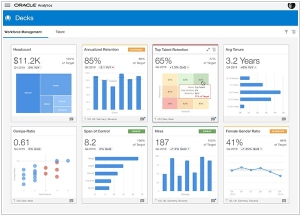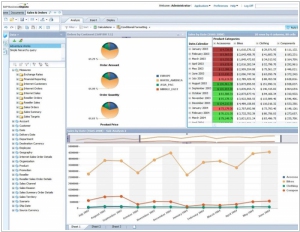Oracle Analytics vs SAP Business Objects
June 10, 2023 | Author: Michael Stromann
5

Gain comprehensive business intelligence with augmented analytics to help your organization grow through unique insights. Oracle Analytics uses embedded machine learning and artificial intelligence to analyze data from across your organization so you can make smarter predictions and better decisions.
7

Empower your people with easy access to the business intelligence (BI) and data visualization tools solutions they need to make faster, more informed decisions. Our BI platform and software can boost your organization’s collective IQ by giving all users the information necessary to drive smarter processes, improve performance, and become more effective in everything they do.
Oracle Analytics and SAP Business Objects are both widely used business intelligence (BI) and analytics platforms, but they differ in their features, approach, and integration capabilities. Oracle Analytics is a comprehensive analytics platform provided by Oracle Corporation, offering functionalities such as data preparation, data visualization, augmented analytics, and embedded analytics. It is part of the larger Oracle Cloud ecosystem and provides seamless integration with other Oracle products and services. Oracle Analytics focuses on delivering a wide range of analytics capabilities, including advanced analytics and machine learning, to help organizations make data-driven decisions. On the other hand, SAP Business Objects is a suite of BI tools offered by SAP, with a primary focus on reporting, ad-hoc analysis, and enterprise-level business intelligence. It includes tools such as Web Intelligence, Crystal Reports, and Analysis for Office. SAP Business Objects emphasizes the ability to create robust reports and dashboards, schedule and distribute them, and provide interactive self-service analytics to business users. SAP Business Objects is often used by organizations that rely heavily on SAP's enterprise resource planning (ERP) systems.
See also: Top 10 Business Intelligence software
See also: Top 10 Business Intelligence software


